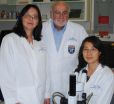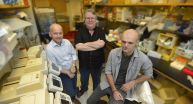Neuroscientists use snail research to help explain 'chemo brain'
2014-10-08
(Press-News.org) It is estimated that as many as half of patients taking cancer drugs experience a decrease in mental sharpness. While there have been many theories, what causes "chemo brain" has eluded scientists.
In an effort to solve this mystery, neuroscientists at The University of Texas Health Science Center at Houston (UTHealth) conducted an experiment in an animal memory model and their results point to a possible explanation. Findings appeared in The Journal of Neuroscience.
In the study involving a sea snail that shares many of the same memory mechanisms as humans and a drug used to treat a variety of cancers, the scientists identified memory mechanisms blocked by the drug. Then, they were able to counteract or unblock the mechanisms by administering another agent.
"Our research has implications in the care of people given to cognitive deficits following drug treatment for cancer," said John H. "Jack" Byrne, Ph.D., senior author, holder of the June and Virgil Waggoner Chair and chairman of the Department of Neurobiology and Anatomy at the UTHealth Medical School. "There is no satisfactory treatment at this time."
While much work remains, Byrne, who runs the university's Neuroscience Research Center, said understanding how these drugs impact the brain is an important first step in alleviating this condition characterized by forgetfulness, trouble concentrating and difficulty multitasking.
Byrne's laboratory is known for its use of a large snail called Aplysia californica to further the understanding of the biochemical signaling among nerve cells (neurons). The snails have large neurons that relay information much like those in humans.
When Byrne's team compared cell cultures taken from normal snails to those administered a dose of a cancer drug called doxorubicin, the investigators pinpointed a neuronal pathway that was no longer passing along information properly.
With the aid of an experimental drug, the scientists were able to reopen the pathway. Unfortunately, this drug would not be appropriate for humans, Byrne said. "We want to identify other drugs that can rescue these memory mechanisms," he added.
The scientists confirmed their findings in tests on the nerve cells of rats.
"The big picture is to determine if this cancer drug acts in the same way in humans," Byrne said.
According the American Cancer Society, some of the distressing mental changes cancer patients experience may last a short time or go on for years.
INFORMATION:
Byrne's UTHealth research team includes co-lead authors Rong-Yu Liu, Ph.D., and Yili Zhang, Ph.D., as well as Brittany Coughlin and Leonard J. Cleary, Ph.D. All are affiliated with the W.M. Keck Center for the Neurobiology of Learning and Memory.
Byrne and Cleary also are on the faculty of The University of Texas Graduate School of Biomedical Sciences at Houston. Coughlin is a student at the school, which is jointly operated by UTHealth and The University of Texas MD Anderson Cancer Center.
The study titled "Doxorubicin Attenuates Serotonin-Induced Long-Term Synaptic Facilitation by Phosphorylation of p38 Mitogen-Activated Protein Kinase" received support from National Institutes of Health grant (NS019895) and the Zilkha Family Discovery Fellowship.
[Attachments] See images for this press release:

ELSE PRESS RELEASES FROM THIS DATE:
2014-10-08
Certain types of corals, invertebrates of the sea that have been on Earth for millions of years, appear to have found a way to survive some of their most destructive threats by attaching to and growing under mangrove roots.
Scientists with the U.S. Geological Survey and Eckerd College recently published research on a newly discovered refuge for reef-building corals in mangrove habitats of the U.S. Virgin Islands. More than 30 species of reef corals were found growing in Hurricane Hole, a mangrove habitat within the Virgin Islands Coral Reef National Monument in St. John.
Corals ...
2014-10-08
CHAMPAIGN, Ill. — A new study offers fresh insights into how talking on a cell phone or to a passenger while driving affects one's performance behind the wheel. The study used a driving simulator and videophone to assess how a driver's conversation partner influences safety on the road.
"We've done years of study on driver distraction, and previous studies suggest that passengers often aren't distracting. In fact, passengers can be helpful, especially if they're adults who have had experience and also are active drivers themselves," said University of Illinois psychology ...
2014-10-08
Peer-to-peer file sharing of movies, television shows, music, books and other files over the Internet has grown rapidly worldwide as an alternative approach for people to get the digital content they want -- often illicitly. But, unlike the users of Amazon, Netflix and other commercial providers, little is known about users of peer-to-peer (P2P) systems because data is lacking.
Now, armed with an unprecedented amount of data on users of BitTorrent, a popular file-sharing system, a Northwestern University research team has discovered two interesting behavior patterns: ...
2014-10-08
Cold Spring Harbor, NY – It's one of those ideas that seems to make perfect sense: the bigger the brain, the more intelligent the creature. While it is generally true, exceptions are becoming increasingly common. Yet the belief persists even among scientists. Most biologists, for example, assume that rats, with larger brains, are smarter than mice. Cold Spring Harbor Laboratory (CSHL) scientists now challenge this belief. They compared mice and rats and found very similar levels of intelligence, a result that could have powerful implications for researchers studying ...
2014-10-08
WASHINGTON - Children who are emotionally abused and neglected face similar and sometimes worse mental health problems as children who are physically or sexually abused, yet psychological abuse is rarely addressed in prevention programs or in treating victims, according to a new study published by the American Psychological Association.
"Given the prevalence of childhood psychological abuse and the severity of harm to young victims, it should be at the forefront of mental health and social service training," said study lead author Joseph Spinazzola, PhD, of The Trauma ...
2014-10-08
AUGUSTA, Ga. – A fundamental theory about how our thymus educates our immune police appears to be wrong, scientists say.
It's known that stem cells come out of the bone marrow and travel to the tiny thymus gland behind the breastbone to learn to become one of two CD4T cell types: one leads an attack, the other keeps the peace.
One widely held concept of why they become one or the other is that, despite coming from the same neighborhood and going to the same school, they are exposed to different things in the thymus, said Dr. Leszek Ignatowicz, immunologist at ...
2014-10-08
Rockville, MD – The Society for Disaster Medicine and Public Health is committed to examining the details of individual disasters and public health crises. With the recent arrival of Ebola in the United States, the journal is launching a special issue on the virus. The journal will serve as an educated and authoritative voice on the virus, risk and threat level, potential of outbreak, preparation and response for the public and media.
The Journal of Disaster Medicine and Public Health Preparedness, began covering events in their entirety via special issues this ...
2014-10-08
NEW YORK, NY (October 8, 2014)—For benign gynecologic conditions, robot-assisted surgery involves more complications during surgery and may be significantly more expensive than conventional laparoscopic surgery, according to a study by researchers at Columbia University Medical Center (CUMC). The results were published online today in Obstetrics & Gynecology.
Robot-assisted surgery was first widely used for radical prostatectomy. For procedures such as prostatectomy, where there were previously no minimally invasive options, robot-assisted laparoscopy often offered ...
2014-10-08
This news release is available in French. Montreal & Vancouver, October 8, 2014 — From the words for colours to how to tie a shoelace, kids have lots to learn — and for the most part, they depend on others to teach it to them.
But whether deliberately or inadvertently, other people sometimes misinform. So at what age can kids tell trustworthy teachers from confident tricksters?
A new study published in PLOS ONE by psychology researchers from Concordia University and the University of British Columbia shows that by the age of five, children become wary ...
2014-10-08
HOUSTON – (Oct. 8, 2014) – Managers can promote creativity in employees by "empowering leadership" and earning employees' trust, according to a new study by Rice University and American University.
The researchers investigated, for the first time, the complex effect of the interaction among empowering leadership, uncertainty avoidance and trust on creativity. They collected supervisors' ratings of employee creativity in two separate studies in China: one with employees of an energy-saving light bulb design and manufacturing company and the other with the employees ...
LAST 30 PRESS RELEASES:
[Press-News.org] Neuroscientists use snail research to help explain 'chemo brain'



